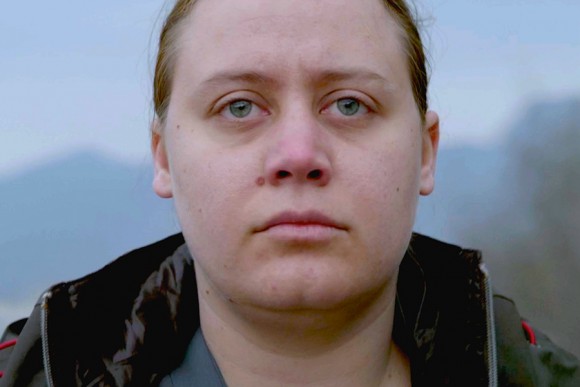One of the many legends surrounding the peak is that, during the Ottoman occupation a priest tried to save locals by taking them there so that they would be closer to God — plans that culminated in a massacre. If Bezbog itself is godless, it’s appropriate that there is nothing godlike in the repellent characters of Petrova’s film, where the mountain serves both as backdrop and metaphor for a Bulgarian society intoxicated with corruption and misanthropy.
The film follows Gana (Irena Ivanova), a social care worker for the elderly in smalltown Vratsa, who steals her patients’ ID cards and sells them to police officials on the black market. Several close-ups shot from different angles in 4:3 aspect ratio and dim tones capture her personality precisely: an apathetic human-like animal with a blank stare. Most of her patients, however, don’t stir much sympathy either — they either curse everything in sight or rave about kind-hearted German occupants. However, we catch a glimpse of a soul in Gana’s eyes at the funeral of the old lady she took care of and later on she develops a father-daughter-like bond with her patient Yoan (Ivan Nalbantov), a victim of communism who is also targeted by gangsters.
What starts as a typical drama of Eastern European poverty porn emerges into a psychological thriller with a finely calibrated dramaturgy and the director’s distinguished cinematic approach. Petrova delivers a vivid portrait of her motherland where the weak, together with those in power, sink in a quicksand of immorality and mercilessness, where the heart only functions as a blood-pumping organ and there is no place even for a genuine ‘thank you’. The thoughtful sound mix by Peter Albrechtsen adds accents to the films’ established aesthetics.
As Gana, Ivanova is also a feature debutant, and provides a woefully realistic and emotionally guarded performance. While figuratively drowning, the heroine tries to catch a straw: what spirituality she lacks, she finds in Yoan. (What are the chances of Yoan being the most enduring of the biblical names?) Our protagonist confesses to her mother that she wants to love, but cannot, accusing her of the same thing. But even in this moment of epiphany, reality strikes back.
“It’s never too late,” Yoan tells Gana when she asks about joining the choir he conducts and with those words a chance for redemption resurges. But if gangrene has already spread through a body, would cutting off a limb help? Or should God take justice in his almighty hands? The final sequence, in which justice is dished out n the couloirs of Bezbog, leaves us with much space for personal interpretations.




















